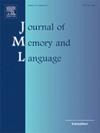Initially encoding attended but outdated information into working memory: behavioral and neural evidence
IF 3
1区 心理学
Q1 LINGUISTICS
引用次数: 0
Abstract
Attention has traditionally been regarded as a gateway to working memory, largely determining whether information enters it. Recent work suggests that the brain actively inhibits attended but outdated information to prevent it from entering working memory. However, it remains unknown whether this information is blocked directly by attention before entering working memory, or after being encoded into working memory, given that such information has already been attended to and processed. This study explored this question by manipulating stimulus onset asynchronies (SOAs) in three experiments, including behavioral and electroencephalography (EEG) measures, and examining memory traces of attended but outdated information at different time points. Behavioral evidence demonstrated the stability of the memory trace of the attended but outdated information only when SOA was short. This finding was observed across different features and paradigms. Time-frequency analysis indicated that the brain inhibited attention to information matching the attended but outdated information in the early stage, with behavioral performance predicted by alpha modulation of the right hemisphere. These results suggest that attended but outdated information is initially encoded into working memory, even though it does not need to be remembered. These findings enhance our understanding of the impact of attention on working memory.
最初是将参与但过时的信息编码到工作记忆中:行为和神经证据
传统上,注意力被认为是进入工作记忆的门户,在很大程度上决定了信息是否进入工作记忆。最近的研究表明,大脑会主动抑制已参与但过时的信息,以防止其进入工作记忆。然而,目前尚不清楚这些信息是在进入工作记忆之前被注意力直接阻止,还是在被编码到工作记忆之后,因为这些信息已经被注意和处理了。本研究通过三个实验来探讨这一问题,包括行为和脑电图(EEG)测量,以及在不同时间点检查参与但过时信息的记忆痕迹。行为证据表明,只有在SOA很短的情况下,参与但过时的信息的内存跟踪才具有稳定性。这一发现是在不同的特征和范式中观察到的。时间-频率分析表明,大脑在早期阶段抑制了对与已注意但已过时的信息相匹配的信息的注意,其行为表现由右半球的α调制预测。这些结果表明,被关注但过时的信息最初被编码到工作记忆中,即使它不需要被记住。这些发现增强了我们对注意力对工作记忆影响的理解。
本文章由计算机程序翻译,如有差异,请以英文原文为准。
求助全文
约1分钟内获得全文
求助全文
来源期刊
CiteScore
8.70
自引率
14.00%
发文量
49
审稿时长
12.7 weeks
期刊介绍:
Articles in the Journal of Memory and Language contribute to the formulation of scientific issues and theories in the areas of memory, language comprehension and production, and cognitive processes. Special emphasis is given to research articles that provide new theoretical insights based on a carefully laid empirical foundation. The journal generally favors articles that provide multiple experiments. In addition, significant theoretical papers without new experimental findings may be published.
The Journal of Memory and Language is a valuable tool for cognitive scientists, including psychologists, linguists, and others interested in memory and learning, language, reading, and speech.
Research Areas include:
• Topics that illuminate aspects of memory or language processing
• Linguistics
• Neuropsychology.

 求助内容:
求助内容: 应助结果提醒方式:
应助结果提醒方式:


